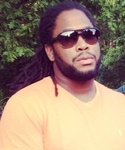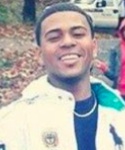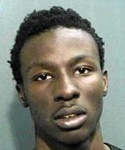In a stark room at Nashua Street Jail, Reverend Laura Buchanan Ahart is dancing to gospel playing from a clock radio and making preparations for the baptism. On a makeshift pad of old blue tarps, a Jacuzzi-sized Rubbermaid tub is already filled with water. She notices some dust floating on top and asks a guard for chlorine. She’s expecting thirty men.
When they begin to arrive, Reverend Laura is still spraying purple fluid into the pool. She lifts up her bottle, points it at laughing prisoners, and says, “Watch this, I’ll squirt you right here.” They’re wearing uniforms that look like doctors scrubs. They have to change into all-white versions of the same clothes before the baptism can begin.
One man takes off his glasses before he sits in the tub. Another man plugs his nose. Reverend Laura and her colleague, Reverend Tim Allen, put their hands on each man’s shoulders and pray, easing him under water and then returning him to air. One man drapes a towel over his head like a veil. He stands by the tub, head tilted to one side, and focuses expectant eyes on each man who follows him.
Reverend Laura dances between immersions. She chats with the guards. She runs off to get one man a change of underwear. She nearly misses a few of the baptisms. She has a lot on her mind. Her son is coming home for Christmas in less than a week, and she’s already begun stocking up on chicken breasts and pork chops to cook him. An incoming snowstorm could prevent her from preaching to these men tomorrow.
Every Sunday morning, in the same room, she calls her prisoner parishioners “Men of God, world changers.” Most of them are awaiting trial. They don’t know whether they’ll be released back into Boston or sentenced to years, even a lifetime, in prison. Reverend Laura wants to know how long they plan to keep their souls in prison. At their baptism she says, “We pray that though they are incarcerated, they do not have to be incarcerated in spirit.” Baptism is a ceremony; bars are material. She is willing to love anyone into freedom of the heart.
Laura keeps a document that maps her life from her birth in Dorchester, 1960, up until January 21st of 2006. On that day, she awoke at 3:00 in the morning and said, “God, we really don’t have to do this.” She was meant to deliver the document, her 13-page ordination paper, that afternoon.
Laura’s grandmother, who was actually her maternal step-grandmother, raised Laura and her two siblings, who are actually her blood cousins. Laura’s parents worked so many hours, they weren’t home often. Her grandmother taught her that Jesus would see her through any trial, any joy. By the time Laura was twelve, however, Laura was the trial. Her grandmother sent her to live at her parents’ house.
Laura turned away from the church. She became pregnant as a teenager and delivered a son. Her father died while she was pregnant. Laura and her mother began raising Laura’s beloved baby boy. Seven years later, her mom died, and Laura found herself on her own in a way she’d never been before. Her aunt asked her to go to church, but she didn’t see the use. She met another man, and in 1990 became pregnant with a second son. After his birth, she began to have dreams about God. She tried to ignore her dreams, but they recurred.
In January 1991, at the age of 30, Laura went to church. “There was a woman in the choir praising and worshiping God with all heart, caught up in the spirit. It touched my heart and I said to myself, ‘I want what she has.’”
Laura began attending Morning Star Baptist in Mattapan. The church was founded in Dorchester in 1965, moved to a larger building in Roxbury in ‘68, and then to a yet larger building at 1257 Blue Hill Ave. In 2004, after a capital campaign, Morning Star moved in to a new 30,000 square foot facility at its Mattapan address. It now boasts 2,000 members, and strong programs for aspiring ministers.
Laura met Gwendolyn Spence, the first of her Spiritual Moms, at Morning Star. Spence, who is now Reverend Spence, guided Laura in her faith. “She just went forth,” said Spence. “She was outspoken, she was her own person no matter what. When she was with us, she brightened up the world in the midst of storms.”
At a breakfast event at Morning Star in 1996, Laura met a woman who ministered to inmates at a nearby prison. Laura asked the woman if she could come along. She asked out of curiosity, but she’d been to prisons before. She used to visit people she knew, just to check on their wellbeing. She never told her friends on the outside that she was going. In 1996, Laura went for the first time as a volunteer with the church. Seventeen years later, she is still going. Now it’s her paid job. Reverend Laura learned to pastor in prisons.
Laura was 45 years old when she woke up before dawn on that January morning in 2006. She had to present her document – her life story up until this day of becoming – to two dozen plus bishops and pastors who could grant or deny her ordination. Reverend Spence was in the audience. “She spoke very well,” said Spence. “She spoke right to the point about everything.” Laura won a unanimous vote.
One month later, on a Sunday in February, the congregation at Morning Star celebrated Laura’s ordination. “I was involved in fourteen ministries,” she recalls, “and all fourteen ministries cooked.” Laura loves to talk about her ordination day. “I had meatballs, I had fish, fried chicken, baked chicken, curried chicken, macaroni and cheese, rice and peas, white rice, yellow rice, collard greens, cabbage, turkey. What did I leave out?” She left out the desserts. “I had sheet cakes, I had strawberry short cakes, I had pound cake, I had lemon cake. Punch, string beans, barbeque chicken. Everything. I had chicken ziti and broccoli. Chicken parmesan. I had food for about a month left over. I gave everybody some.”
She did her first funeral five days later. It was a committal, or a graveside service, for a man she’d known growing up. Since then, she’s preached one or more eulogies per week, nearly every week of the year. She didn’t preach her first homicide funeral until the winter of 2008.
Laura’s eldest son called her in the middle of the night to tell her that his ex-girlfriend’s brother had died. Tyrone Credle, whom Laura knew as T.Y., was Boston’s fifth homicide victim in four days. He was the eighth homicide victim that year. It was January 18th. T.Y.’s sister asked Reverend Laura to eulogize her brother.
Two days before she got the call about T.Y., 23-year-old Darius Jones had been shot to death as he was departing the funeral for 18-year-old Darrion Carrington. Carrington had been shot to death at a Chinese restaurant on January 7th. “I was petrified. I’m not even going to sugar coat it,” said Reverend Laura.
“I called my pastor, Reverend Borders, and I said, ‘Sir, it’s my first time doing a homicide.’ I was waiting for this long, maybe fifteen-minute conversation. He gave me two sentences. He said, ‘Preach Christ. And keep order.’ I was like, ‘That’s it? That’s it?’ That was it.”
Laura remembers the pallbearers carrying T.Y.’s corpse into her empty sanctuary, and the woman doing T.Y.’s makeup right there on the altar, two hours before anyone arrived. “For homicide services, they bring the body earlier than they would any other time because they don’t want any problems,” Laura explains.
She recognized the mourners as they walked in to her church. She greeted each one at the door. Her spiritual moms were there. Ex-prisoners she knew from Nashua Street, where she had now been working for nearly a decade, were there. By Laura’s count, members of fourteen gang organizations walked in to her church that day.
“As they were coming in, I said, ‘Good morning. Praise the Lord. How are you? I need you gentlemen and ladies to do a couple things. Housekeeping rules.’ They said, ‘What’s that, Sister Laura?’ I said, ‘I need you to take off your hats because it’s disrespect. I need you to turn your phones on vibrate or silent. I need you to keep your guns in your pockets.’ And they did. They did.”
Reverend Laura preached from Second Chronicles, 7:14.
If my people, who are called by my name, will humble themselves and pray and seek my face and turn from their wicked ways, then I will hear from heaven, and I will forgive their sin and will heal their land.
Three weeks later she was doing her rounds at Nashua Street Jail when she heard a knock from inside one of the cells. She approached. The man inside asked her whether she remembered him from T.Y. Credle’s funeral; he’d been especially reluctant to take off his hat. “I said, ‘I see you’ve taken it off now though, huh?’ He said, ‘Yeah.’ I said, ‘Okay.’ He said, ‘Can I get a Bible?’ and I said, ‘You sure can, baby. You sure can.’” That funeral was the beginning of her breakthrough with the people she most loves to serve.
“God said to me yesterday, he said, ‘You have a gift. You have a remarkable gift.’ I said, ‘I know.’” She’d just finished preaching a funeral for an elderly gentleman, and she had two more funerals to preach in the next week. She also planned to drop off a handwritten letter from an inmate at Nashua Street to be read at a funeral service. The funeral was for 21-year-old Andrew McGee, shot before Thanksgiving and buried after. The letter writer was Andrew’s cousin. Laura delivered the letter and then said a prayer over Andrew’s body, on an altar bedecked in poinsettias and Christmas trees.
The funerals are extras in an already busy schedule. Every Monday and Tuesday, Laura works the overnight shift at Rosie’s Place, a Boston homeless shelter for women. She sometimes works an evening shift on Rosie’s outreach van, from which she talks with “all walks of life.” She chairs the Criminal Justice Committee for the Black Ministerial Alliance. Every Monday, Wednesday, and Friday she goes to Boot Camp exercise class at the Shelburne Community Center. She hosts Bible Study on Wednesday evenings. She preaches two sermons each Sunday: one to the men at Nashua Street and one to her congregation at United Baptist Church in Jamaica Plain. She works 25 hours per week at the jail, mostly providing one-on-one spiritual counseling to inmates. Every fifth Sunday at 10:00 p.m. she hosts a radio show called “The Hidden Box” on 1330 AM Boston Praise Radio. The people at Nashua Street and South Bay House of Corrections can tune in. On Mondays (“my day to sort of zone out,” she said) she usually gets her hair and nails done for the week, and personally cleans her church. She occasionally hosts an all-night prayer vigil, officiates a wedding, or prepares a special baptism. She almost always has a change of clothes in her car so that she can don the right outfit for her next activity.
Reverend Laura wears a white-collared clergy shirt when she’s preaching funerals. When she’s at the jail, she wears what she likes. Shopping is her release. She pairs her clergy shirt with a black blazer and a straight-cut black tea-length skirt. She wears black flats with jewels on the toe or black boots that zipper up the back.
Laura wore her funeral skirt and a gold sweater trimmed with black and white spots up one side at a recent panel discussion on a new UMass study: “Religion and Recidivism: Focus on Roxbury, Dorchester, and Mattapan.” The event was at Grace Church of All Nations in Dorchester. Laura was one of nine Boston pastors invited to speak. Attorney General Martha Coakley kicked off the discussion with a few words (“I believe the time has come to spend more money on education than on incarceration.”) Laura took a seat at the far end of the panelist table – the only woman, the only one in yellow.
Sometimes the parishioners at Nashua Street comment on their pastor’s look. They like her outfits. One Sunday she told them: “Don’t count yourselves out because you’re sitting here in gray and gold suits.” Then she pointed to her heart. “Real freedom is in here.”
On the Sunday before Thanksgiving, Reverend Laura scanned an empty room at Nashua Street Jail and declared, “This chapel is dirty.” Guards were already walking her parishioners to the service. “It’s too late now, but can we get a detail up in this chapel? Because we have dirt balls in here.”
Her congregants arrived moments later. She greeted each man at the door. Most of them carried worn paperback bibles. She offered little 4-inch versions of the New Testament – psalms and proverbs only – to those men without. One prisoner made neat stacks of the little giveaway bibles. The prison chapel has space for 50 parishioners. Only a few chairs were empty.
They started the service with a round of applause that lasted as long as an encore. Then she took hymn suggestions from her congregation, and they sang together. Five men came to the front of the room to offer testimonies of Thanksgiving.
She told them a story about something that had happened to her that week. She was standing in the parking lot outside of a Stop & Shop when she saw a young man coming towards her. “I’ve been looking for you,” he said. She’d ministered to him in jail not long ago.
“What? Why are you looking for me?” He had his pants down almost to his knees. Among his peers, he’s known as a shooter. She remembered a time she’d lit into him for his ways, and wondered if the Lord had decided to take her right there in the parking lot.
“I need some prayer,” said the man. “Oh you need prayer?” she said. “Well pull up those pants and I’ll give you some prayer.” He put his hands in hers and they closed their eyes while she prayed out loud.
The men were silent, waiting for her lessons. She reminded them that they could seek her out when they were released. She wanted to see them at her church in Jamaica Plain.
When it was over, the men milled around the room, shaking hands and talking. “We’re lucky to have her,” said one man. Another stood alone, looking out the window, waiting to be escorted to his cell. Cars were coming off the Zakim Bridge, speeding up 93 North. There was no snow, yet Boston looked cold. The Charles River looked cold. Reverend Laura would be on the road herself in a few minutes, on her way to preach the 11:00 service at her church.
Before she left the jail, Laura stopped at her office. She shares a shallow desk with Reverend Allen, Nashua Street’s other Protestant chaplain. The Catholic chaplain, Deacon Jerry Ryan, keeps the desk to her left. The Muslim chaplain, Imam Ma’alam Abdullah, keeps the desk to her right. The four chaplains compare schedules, challenges, and joys when they have the chance.
“I tell Laura all the time,” says Imam Abdullah, “this is a movie and a book deal. A woman pastor in a men’s facility for fifteen years? It’s unheard of.”
According to the Massachusetts Department of Correction, the state’s average daily sentenced prisoner population has increased from 11,475 in 2010; to 11,732 in 2011; to 11,819 in 2012. Of the 2,718 inmates released from prison in 2008, 39 percent returned within three years. Seven percent of those committed no new crime; they went back on technical violations of their parole. Nashua Street is a jail, not a prison. The men there have not yet been sentenced to terms, and they may win their cases. Yet even those who escape a sentence often return. All four chaplains are striving to rehabilitate these men. They know ex-offenders who have transformed their lives. They see those men on the outside.
In her 2006 ordination paper, Laura wrote this:
I have watched the revolving door that takes place in the lives of the inmates and detainees. They often return with no direction or structure. God has given me a vision through a dream to open a house for the homeless, ex-offenders. It will also be set up for re-entry services for broken lives to get back on their feet in society and in their respective communities.
She still has that dream.
Reverend Laura walks along the sidewalk towards the Nashua Street parking lot after Sunday service. She’s tall, her hair is curled, her nails are done, and her bracelets jangle a little. She’s 53 years old. She’s wearing an ankle-length fur coat she got at the Goodwill in Jamaica Plain for $69.99. She hears a thumping sound – something fainter than the cars or even the wind. She looks up and waves at the men who were knocking on their windows from inside the jail. The service at her own church in Jamaica Plain has already begun, and she’s not yet in her car. When she arrives, two orange cones are blocking off a spot right outside the church. Someone has written “Pastor” on each cone.
A guest minister from Morning Star Baptist delivers a sermon on surviving transition. Keion Rowell, a man Laura ministered to while he was in jail, has been leading her congregation in song for the duration of the service. He has a nice voice. He gets nervous before church. He comes, he says, because his life depends on it. Laura is his spiritual mother. Reverend Allen is his spiritual father.
Keion picks up the microphone and starts singing the last song. Then the organist joins in. Laura is rapt – eyes open, cheekbones high, clapping the heels of her hands and singing along with him, “This little light of mine, I’m gonna let it shine.”









